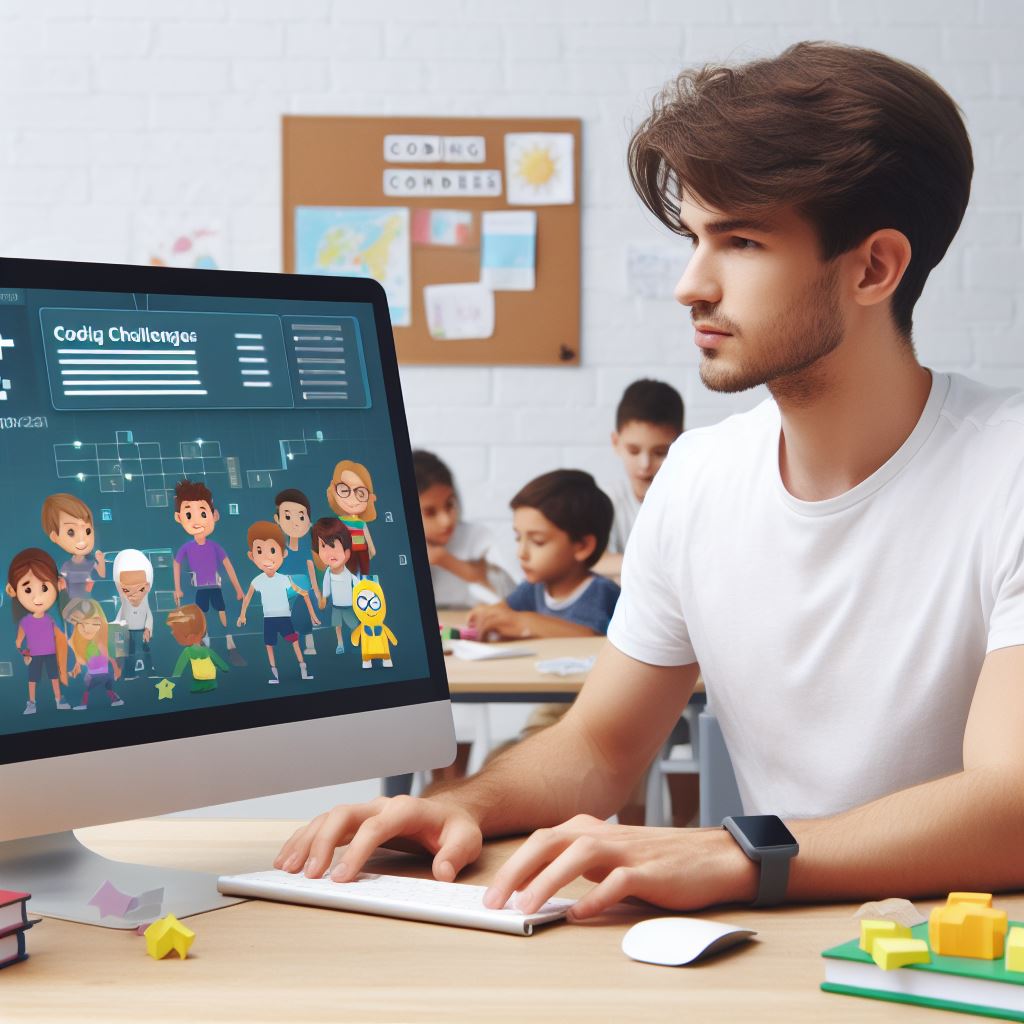Introduction
Let’s explore high school coding: Is Khan Academy enough?
Coding has become an essential skill in today’s world, and high school students are increasingly interested in learning it.
High school coding programs aim to teach students computer programming skills to prepare them for future careers in technology.
Khan Academy is a popular online platform that offers coding courses, providing students with a convenient way to learn.
While Khan Academy is a valuable resource, it may not be enough to fully equip high school students with coding skills.
High school coding classes expose students to various programming languages, algorithms, and problem-solving techniques.
However, a significant number of students struggle to grasp complex concepts through self-paced online courses.
Furthermore, high school coding programs often incorporate hands-on projects and team collaborations, which allow students to apply their skills in real-world scenarios.
These interactive experiences are crucial for developing a deeper understanding of coding principles.
Khan Academy’s coding courses primarily focus on providing individualized instruction through video tutorials and practice exercises.
While this format offers flexibility, it lacks the dynamic and immersive learning environment that traditional high school coding classes provide.
In short, although Khan Academy serves as a useful supplement to high school coding education, it cannot replace the comprehensive learning experience that schools offer.
To ensure students acquire a well-rounded coding foundation, a combination of online resources and traditional classroom instruction is necessary.
Read Python on Khan Academy: A Comprehensive Review
Advantages of Khan Academy for high school coding
Accessibility and availability
- Khan Academy provides free access to its coding courses, making it accessible to all students.
- The online platform allows students to learn coding at their own pace and convenience.
- Students can access the courses anytime and anywhere with an internet connection.
- It eliminates the need for specialized software or expensive coding textbooks, making it affordable for everyone.
Structured curriculum and courses
- Khan Academy offers a well-structured curriculum that covers various coding languages and concepts.
- The courses are designed to gradually build students’ coding skills from beginner to advanced levels.
- Each course includes video tutorials, interactive exercises, and quizzes to reinforce learning.
- The curriculum provides a solid foundation in coding principles and prepares students for real-world coding challenges.
Supportive learning community
- Khan Academy provides a supportive environment where students can engage with a community of learners.
- Students can ask questions, seek help, and receive feedback from both instructors and fellow peers.
- The community aspect fosters collaboration, teamwork, and encourages students to learn from each other.
- By participating in discussions and forums, students can enhance their problem-solving abilities.
Practice exercises and coding challenges
- Khan Academy offers a wide range of practice exercises to reinforce coding concepts and programming techniques.
- These exercises provide hands-on experience and help students apply what they have learned.
- The platform also provides coding challenges that allow students to solve real-world problems.
- The challenges test students’ skills and creativity, improving their problem-solving and critical thinking abilities.
In fact, Khan Academy provides several advantages for high school students learning coding.
Tech Consulting Tailored to Your Coding Journey
Get expert guidance in coding with a personalized consultation. Receive unique, actionable insights delivered in 1-3 business days.
Get StartedIts accessibility and availability make it a viable option for all students, regardless of their background or financial resources.
The structured curriculum ensures a comprehensive learning experience, and the supportive learning community encourages collaboration and active learning.
The practice exercises and coding challenges further enhance students’ skills and prepare them for real-world coding.
Khan Academy emerges as a valuable resource for high school students seeking to develop their coding abilities.
Read: 10 Mistakes to Avoid When Coding Your First Website
Limitations of Khan Academy for High School Coding
Limited Language and Technology Options
- Khan Academy primarily focuses on teaching coding using JavaScript, limiting the exposure to other programming languages.
- It lacks tutorials and lessons on popular programming languages like Python, Java, C++, and Ruby.
- High school students may not get a comprehensive understanding of different programming languages and their applications.
- Limited technology options also restrict the exploration of various software development tools and frameworks.
Lack of Hands-on Coding Experiences
- Khan Academy offers a limited number of coding challenges and projects for high school students.
- Students may not have enough opportunities to create their own programs and practice coding independently.
- Hands-on experiences are crucial to reinforce coding concepts and develop problem-solving skills.
- The absence of real-world coding scenarios and projects may hinder students’ ability to apply their knowledge effectively.
Inadequate Real-World Application Examples
- Khan Academy’s coding lessons often lack practical examples of how coding is used in real-world scenarios.
- High school students may struggle to see the relevance and application of the coding concepts they learn.
- Without exposure to real-world applications, students may perceive coding as purely theoretical and disconnected from their interests.
- Real-world examples are essential to inspire students and demonstrate the practicality of coding skills in various industries.
Insufficient Depth and Complexity in Coding Concepts
- Khan Academy’s coding curriculum tends to cover coding concepts at a basic level, lacking in-depth exploration of advanced topics.
- High school students with prior coding experience may find the content too elementary and not challenging enough.
- Insufficient complexity in coding concepts may limit the growth and advancement of talented high school coders.
- To keep up with the evolving field of programming, students need exposure to complex coding concepts and advanced problem-solving techniques.
While Khan Academy serves as a valuable resource for high school coding education, it is crucial to recognize its limitations.
Its limited language and technology options may hinder students from exploring other programming languages and tools widely used in the industry.
The lack of hands-on experiences and real-world application examples can diminish students’ understanding and motivation.
Additionally, the curriculum’s insufficient depth and complexity in coding concepts may not cater to the needs of advanced high school coders.
To ensure a comprehensive coding education, it is advisable to supplement Khan Academy with additional resources and platforms that address these limitations.
Read: 10 Must-Try Projects on Khan Academy’s Coding Courses

Gain More Insights: Why Free Coding Websites Are Worth Your Time
Supplementing Khan Academy for high school coding
Exploring additional coding platforms
- Codecademy: Offering interactive coding lessons, Codecademy provides a comprehensive range of programming languages.
- Udemy: Known for its extensive library of online courses, Udemy covers various coding topics.
- FreeCodeCamp: A nonprofit organization, FreeCodeCamp offers a hands-on approach to learning coding skills.
Joining coding communities and forums
By joining coding communities and forums, high school students can enhance their coding skills through:
- Sharing and receiving feedback on coding projects.
- Collaborating with other coders to solve real-world problems.
- Getting involved in discussions about coding trends and best practices.
Participating in coding competitions and hackathons
Coding competitions and hackathons offer high school students the opportunity to:
Build Your Vision, Perfectly Tailored
Get a custom-built website or application that matches your vision and needs. Stand out from the crowd with a solution designed just for you—professional, scalable, and seamless.
Get Started- Showcase their coding skills and creativity.
- Engage in friendly competition with peers.
- Learn from experienced coders and industry professionals.
Seeking mentorship or guidance from experienced coders
High school students can seek mentorship or guidance from experienced coders to:
- Receive personalized feedback and advice on their coding projects.
- Gain insights into real-world coding practices and career paths.
- Develop a network of connections within the coding community.
In general, while Khan Academy provides a solid foundation for high school coding education, it is essential for students to supplement their learning with additional resources.
Exploring other coding platforms such as Codecademy, Udemy, and FreeCodeCamp can offer a broader range of coding languages and topics.
Joining coding communities and forums allows students to engage in discussions, receive feedback, and collaborate with other coders.
Participation in coding competitions and hackathons enables students to showcase their skills and learn from industry professionals.
Seeking mentorship from experienced coders can provide personalized guidance and valuable insights into the coding world.
By embracing these supplementary resources and opportunities, high school students can excel in their coding journey and prepare themselves for future success.
Read: Improving Problem-Solving Skills with Coding Challenges
Conclusion
In summary, this blog section r has discussed the limitations of Khan Academy for high school coding education.
Khan Academy is not enough to meet the demands and challenges of high school coding education.
Expanding coding resources in high schools is crucial to ensure students receive a comprehensive coding education.
Summary of Main Points:
- Accessible Introduction: Khan Academy offers a beginner-friendly coding platform for high school students.
- Interactive Learning: Its hands-on approach engages learners through practical coding exercises and projects.
- Comprehensive Curriculum: From basics to advanced topics, Khan Academy covers a wide spectrum of coding concepts.
- Self-Paced Structure: Students can learn at their own speed, fostering individualized understanding and mastery.
Restating the Thesis Statement:
In essence, while Khan Academy provides a solid foundation, it might not suffice for the evolving demands of high school coding education.
Optimize Your Profile, Get Noticed
Make your resume and LinkedIn stand out to employers with a profile that highlights your technical skills and project experience. Elevate your career with a polished and professional presence.
Get NoticedFinal Thoughts on the Importance of Expanding Coding Resources:
To truly prepare students for the digital future, high schools must diversify coding resources, incorporating a mix of online platforms, coding competitions, and hands-on projects.
A well-rounded approach ensures students not only grasp coding fundamentals but also develop problem-solving skills crucial for their future endeavors.




